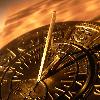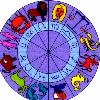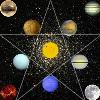

Tags: Astrology View |
Tags: Astrology View |
Astrology picture Astrology jpg Astrology picture sun sign astrology jpg Astrology picture astrology logo jpg Astrology picture astrology 03 gif Tags: Astrology View |
|||||||||
Tags: Astrology View |
|
|
|||||||||
Astrology is a group of systems, traditions, and beliefs which hold that the relative positions of celestial bodies (astronomical object) and related details can provide information about personality (personality type), human affairs and other "earthly" matters. A practitioner of astrology is called an astrologer. Astrologers believe that the movements and positions of celestial bodies either directly influence life on Earth or correspond to events experienced on a human scale. Modern astrologers define astrology as a symbolic language, an art form, or a form of divination. Despite differences in definitions, a common assumption of astrologers is that celestial placements can aid in the interpretation of past and present events, and in the prediction of the future.
Astrology is generally considered a pseudoscience or superstition by the scientific community, which cites a lack of statistically significant astrological predictions, while psychology explains much of the continued faith in astrology as a matter of cognitive biases. In 2006 the U.S. (USA) National Science Board published a statement which said it considers belief in ten survey items, astrology among them, to be "pseudoscientific".cite weburl=7: Science and Technology: Public Attitudes and Understandingauthor=National Science Boardyear=2006work=Science and Engineering Indicators 2006publisher=National Science Foundationat="Belief in Pseudoscience" (see also Footnote 29)accessdate=19 April 2010"...About three-fourths of Americans hold at least one pseudoscientific belief; i.e., they believed in at least 1 of the 10 survey items...29" "29 Those 10 items were extrasensory perception (ESP), that houses can be haunted, ghosts/that spirits of dead people can come back in certain places/situations, telepathy/communication between minds without using traditional senses, clairvoyance/the power of the mind to know the past and predict the future, astrology/that the position of the stars and planets can affect peoples lives, that people can communicate mentally with someone who has died, witches, reincarnation/the rebirth of the soul in a new body after death, and channeling/allowing a "spirit-being" to temporarily assume control of a body."
Numerous traditions and applications employing astrological concepts have arisen since its earliest recorded beginnings in the 3rd millennium BC. Astrology has played an important role in the shaping of culture, early astronomy, the Vedas, and various disciplines throughout history. In fact, astrology and astronomy were often indistinguishable before the modern era, with the desire for predictive and divinatory knowledge one of the motivating factors for astronomical observation. Astronomy began to diverge from astrology after a period of gradual separation from the Renaissance up until the 18th century. Eventually, astronomy distinguished itself as the empirical (empiricism) study of astronomical objects and phenomena, without regard to the terrestrial implications of astrology.
The word "astrology (wiktionary:astrology)" comes from the Latin term astrologia (wiktionary:astrologia) ("astronomy"), which in turn derives from the Greek (Ancient Greek) noun langgrc?????????? (wiktionary:??????????): langgrc?????? (wiktionary:??????), astron ("constellation" or "star") and langgrc-????? (wiktionary:-?????), -logia ("the study of").






